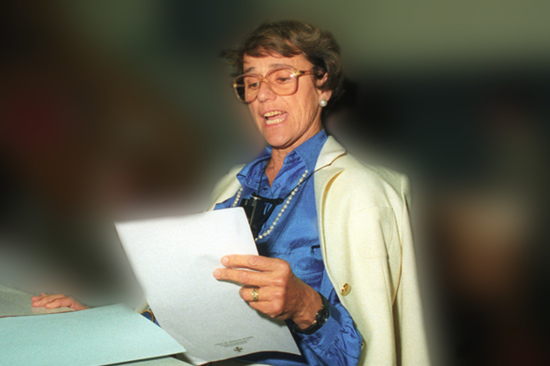On 26 June 2017 Prof. Dr. Ruth Illig peacefully passed away after a life fulfilled with an untiring commitment for children with endocrine diseases. She has been an enthusiastic fighter for the improvement of child health not only in Europe, but also with a global perspective.
Ruth Illig was born on 12 November 1924 in Nuremberg, Germany. Her childhood and adolescence in Germany was affected by the Second World War. During the war, she was brought from Germany to Switzerland to recover from the stressful situation and physical weakening. After the war, she spent a significant time of her academic training in Bern and Zurich. Following graduation from medical school she was accepted by Prof. Guido Fanconi for a pediatric residency at the University Children’s Hospital (Kinderspital) Zurich, Switzerland. She was promoted to a fellow and tenure position and worked closely with Prof. Andrea Prader. In these early years, she focused on growth disorders and she established the endocrine laboratory using radioimmunoassays for determination of growth hormone and insulin. She was then inspired by the idea to prevent mental retardation in children with congenital hypothyroidism by an early treatment with thyroid hormones. With her team, she developed a screening test based on the measurement of TSH in dried filter paper blood spots. After a pilot study in 1976, she started in Switzerland the first nationwide screening program for congenital hypothyroidism in Europe on 1 January 1977. In most countries in Europe nationwide programs were started only years later. With her pioneering assertiveness, she has saved many children from mental retardation and conducted important studies not only on screening methodologies, but also long-term follow-up studies in patients detected by newborn screening.
She was a passionate teacher and numerous pediatric endocrinologists spent their educational or sabbatical leaves training with her at the Kinderspital in clinical endocrinology as well as in Newborn Screening techniques and organization. In 1977, she was the first woman at the children’s hospital to become professor of the medical faculty at the University of Zurich and she supported with great efforts young female scientists and female physicians. She was a very hard worker and wouldn’t accept any weakness or fuzziness of her pupils and coworkers.
Realizing that many European countries in the 1990s were not able to afford newborn screening, she engaged herself to set up programs for congenital hypothyroidism in these countries after her retirement. In this way, she collected funds in a charity foundation to finance the national screening program in Bulgaria. In addition, she got involved with other screening projects, for example in Latin America. Moreover she established and financed an institution for children with visual impairment in Switzerland in 1986. She took care of her physical fitness with swimming in the Lake of Zurich or in the Lago Maggiore in the south of Switzerland.
Ruth Illig was a founding member of the European Society for Paediatric Endocrinology (ESPE) and the President of the 25th annual meeting in 1986 in Zurich. In 2006 ESPE awarded Ruth Illig with the Outstanding Clinician Award. She has put enormous energy in the foundation of newborn screening for congenital hypothyroidism and gave her best to enhance the health of children with endocrine diseases. She has been a distinguished pioneer and role model for many, especially female pediatric endocrinologists world-wide and we will certainly miss her.






